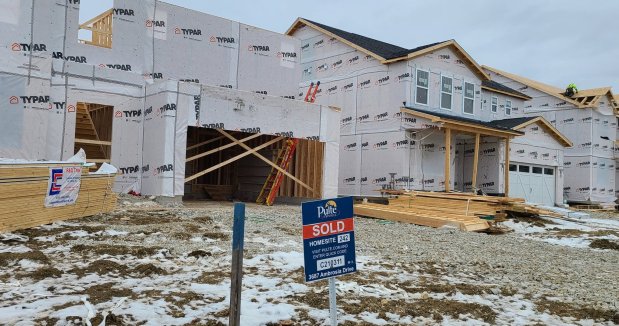Naperville saw returns on real estate transfer tax fall short of budget projections by more than 26% last year.
City staff say 2023’s high interest rate environment slowed sales, which — apart from failing to meet forecasts — posted 40% less revenue than in 2022.
In the grand scheme of Naperville’s 2023 financial performance, though, the less than stellar transfer tax revenue was balanced by a diversified revenue base that, in other areas, remained strong, staff maintain.
“Overall, I would say (the city fared) very, very well,“ Ray Munch, Naperville’s Deputy Finance Director, said in a call Thursday. “There are certainly some areas, from a financial perspective, that always perform better than others. But generally speaking, the city is still in a very solid financial position.
“And we are working through a few challenges in a few very specific areas, but like I said, overall, things are going very well.”
Munch presented 2023 transfer tax numbers as part of a larger, unaudited year-end financial report at a Naperville City Council meeting last week. He covered the city’s performance for the year, detailing where it did — or did not — meet expectations in categories from fund breakdowns to service charges.
Local taxes, for the most part, outperformed projections. But with mortgage rates continuing to climb last year, after starting to rise in 2022, Naperville’s real estate transfer tax produced the lowest annual revenue in 2023 than it has over the past six years.
“I think that stifled the real estate market quite a bit,” Munch said. “And as far as revenues, you know, as soon as sales drop off, that transfer tax revenue declines with it.”
The tax, which is applied when a property transfers ownership, garnered the city $4 million last year, down from $6.6 million in 2022.
Munch said “we fully expected that there would be declining revenues last year” but that the decline “was greater than we expected.”
Nationally, existing U.S. home sales totaled 4.09 million last year, an 18.7% decline from 2022, according to the National Association of Realtors. That is the weakest year for home sales since 1995.
“I don’t know that anyone could predict where mortgage rates would go and how long they would stay there and what the ultimate impact is on real estate sales,” Munch said.
Interest rates aside, another factor in the year-to-year difference for transfer tax is the past few years have been more of an anomaly than a new norm, Munch explained.
Prior to the COVID-19 pandemic, the city hovered around the $4.5 to $5 million range in transfer tax revenue, previous financial reports show. But in 2021, revenue soared to $7.4 million.
“I mean, there were certainly unique things happening in the real estate market from 2020 through 2022 that drove those revenues significantly higher, and we’re always aware of that,” Munch said. “Whether revenues are going up or going down, anytime something is abnormal, we’re paying close attention … and we’re careful not to assume that’s the new normal.”
Munch said the city’s premise for 2024 is that the transfer tax would normalize back to revenues seen before the pandemic.
As for other revenue streams, returns on food and beverage taxes were strong, totaling $7.1 million and exceeding budget projections by 4.7%. Downtown food and beverage tax was particularly strong, surpassing projections by 13%.
Munch qualified the jump slightly, noting that food and beverage revenue is tied to inflation, and with what’s been a high inflationary environment since 2022 just recently starting to slow, trends upward over the past few years are “because of inflation as much as anything else.”
Sales tax revenue exceeded budget estimates by 1.9%, coming in at $47.1 million for 2023, as a result of strong consumer spending and higher prices, according to the city. Income tax revenue was likewise robust, exceeding budget projections by 8.7% with a year-end total of $23.9 million. Staff say the strong performance was due to corporate profits and low unemployment.
Across all funds, total revenues exceeded expenditures by $20.6 million, with two of the city’s primary operating funds — general and water utility — ending with a positive margin.
The third fund, electric utility, swung the opposite direction, ending the year with expenses surpassing revenues by $9.7 million and a declined cash balance.
The drop is in line with steadily declining revenues in recent years, spurred by energy conservation efforts and lower electricity consumption.
In 2021, electric charges totaled $150 million. But by 2022, charges dropped to $141.7 million. And last year, charges decreased again to $139.6 million, falling short of budget projects by 12.7%.
Munch said “it’s an issue we’re aware of and we’re working through.”
“We’ve encouraged energy conservation for a number of years through just public education, as well as grant programs. Now I think you’re starting to see the benefits of that, which frankly is great from an environmental sustainability perspective, but you know, the consequence of that is it does create a more challenging financial situation.”
Munch said an electric rate study is due this year to try and develop a solution.
The Associated Press contributed.




